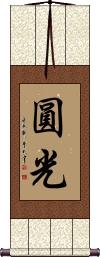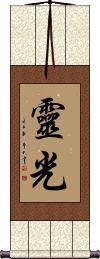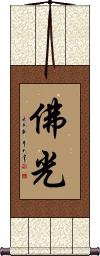Many custom options...
And formats...

Halo in Chinese / Japanese...
Buy a Halo calligraphy wall scroll here!
Personalize your custom “Halo” project by clicking the button next to your favorite “Halo” title below...
Halo
圓光 is one of many ways to express “halo” in Chinese.
圓光 means radiance emanating from the head.
This can refer to the halo surrounding the head of a Buddha.
This is occasionally used to mean “halo” in Japanese, but it is more commonly the surname Enkō in Japan.
You may want to check our dictionary for many more versions of halo.
Divine Light
The Aura of Buddha
These search terms might be related to Halo:
Aura
Corona
Radiance
Radiance / Rays of Light
The Aura of Buddha
Not the results for Halo that you were looking for?
Below are some entries from our dictionary that may match your Halo search...
| Characters If shown, 2nd row is Simp. Chinese |
Pronunciation Romanization |
Simple Dictionary Definition |
佛光 see styles |
fó guāng fo2 guang1 fo kuang bukkō |
More info & calligraphy: The Aura of BuddhaThe light of Buddha, spiritual enlightenment; halo, glory. |
圓光 圆光 see styles |
yuán guāng yuan2 guang1 yüan kuang enkou / enko えんこう |
More info & calligraphy: Halo(surname) Enkou The halo surrounding the head of a Buddha, etc. |
靈光 灵光 see styles |
líng guāng ling2 guang1 ling kuang |
More info & calligraphy: Divine Light |
暈 晕 see styles |
yùn yun4 yün higasa ひがさ |
dizzy; halo; ring around moon or sun halo (around the Sun, Moon, etc.); ring; corona; (surname) Higasa |
二光 see styles |
èr guāng er4 guang1 erh kuang nikō |
The dual lights, i.e. 色光 the halo from a Buddha's body and 心光 the light from his mind. Also 常光 the constant halo from the bodies of Buddhas and 神通光 the supernatural light sent out by a Buddha (e.g. from between his eyebrows) to illuminate a distant world. |
光圈 see styles |
guāng quān guang1 quan1 kuang ch`üan kuang chüan |
aperture; diaphragm; halo; aureole |
光座 see styles |
guāng zuò guang1 zuo4 kuang tso kōza |
prabha-maṇḍala; the halo and throne (of a Buddha); also 光趺. |
光暈 光晕 see styles |
guāng yùn guang1 yun4 kuang yün |
halo; (photography) halation |
光環 光环 see styles |
guāng huán guang1 huan2 kuang huan miwa みわ |
ring of light; halo; (fig.) glory; splendor corona; (female given name) Miwa |
光背 see styles |
guāng bèi guang1 bei4 kuang pei kouhai / kohai こうはい |
halo nimbus |
光輪 see styles |
kourin / korin こうりん |
(See 頭光) halo (esp. in Christian art); nimbus |
円光 see styles |
enkou / enko えんこう |
(1) halo; (2) (net-sl) (homophone of 援交) (See 援交) paid dating (esp. with an underage girl; oft. involving selling of sex); compensated dating; (place-name, surname) Enkou |
十二 see styles |
shí èr shi2 er4 shih erh tooji とおじ |
twelve; 12 12; twelve; (given name) Tooji dvātriṃśa. Thirty-two. 三十二應 (or 三十二身) The thirty-two forms of Guanyin, and of Puxian, ranging from that of a Buddha to that of a man, a maid, a rakṣas; similar to the thirty-three forms named in the Lotus Sūtra. 三十二相三十二大人相 dvātriṃśadvaralakṣaṇa. The thirty-two lakṣaṇas, or physical marks of a cakravartī, or 'wheel-king', especially of the Buddha, i. e. level feet, thousand-spoke wheel-sign on feet, long slender fingers, pliant hands and feet, toes and fingers finely webbed, full-sized heels, arched insteps, thighs like a royal stag, hands reaching below the knees well-retracted male organ, height and stretch of arms equal, every hair-root dark coloured, body hair graceful and curly, golden-hued body, a 10 ft. halo around him, soft smooth skin, the 七處, i. e. two soles, two palms, two shoulders, and crown well rounded, below the armpits well-filled, lion-shaped body, erect, full shoulders, forty teeth, teeth white even and close, the four canine teeth pure white, lion-jawed, saliva improving the taste of all food, tongue long and broad, voice deep and resonant, eyes deep blue, eyelashes like a royal bull, a white ūrnā or curl between the eyebrows emitting light, an uṣṇīṣa or fleshy protuberance on the crown. These are from the 三藏法數 48, with which the 智度論 4, 涅盤經 28, 中阿含經, 三十ニ相經 generally agree. The 無量義經 has a different list. 三十二相經 The eleventh chapter of the 阿含經. 三十二相經願 The twenty-first of Amitābha's vows, v. 無量壽經. 三十三 trayastriṃśat. Thirty-three. 三十三天忉利天; 憺梨天, 多羅夜登陵舍; 憺利夜登陵奢; 憺利耶憺利奢 Trayastriṃśas. The Indra heaven, the second of the six heavens of form. Its capital is situated on the summit of Mt. Sumeru, where Indra rules over his thirty-two devas, who reside on thirty-two peaks of Sumeru, eight in each of the four directons. Indra's capital is called 殊勝 Sudarśana, 喜見城 Joy-view city. Its people are a yojana in height, each one's clothing weighs 六鐵 (1; 4 oz. ), and they live 1, 000 years, a day and night being equal to 100 earthly years. Eitel says Indra's heaven 'tallies in all its details with the Svarga of Brahminic mythology' and suggests that 'the whole myth may have an astronomical meaning', or be connected, with 'the atmosphere with its phenomena, which strengthens Koeppen's hypothesis explaining the number thirty-three as referring to the eight Vasus, eleven Rudras, twelve Ādityas, and two Aśvins of Vedic mythology'. In his palace called Vaijayanta 'Indra is enthroned with 1, 000 eyes with four arms grasping the vajra. There he revels in numberless sensual pleasures together with his wife Śacī... and with 119, 000 concubines with whom he associates by means of transformation'.; dvādaśa, twelve. |
印光 see styles |
yìn guāng yin4 guang1 yin kuang inkō |
Illumination from the symbol on a Buddha's or Bodhisattva's breast. |
天蓋 天盖 see styles |
tiān gài tian1 gai4 t`ien kai tien kai tengai てんがい |
(noun - becomes adjective with の) (1) canopy; dome; (noun - becomes adjective with の) (2) (See 虚無僧) priestly minstrel's reed hood; reed hood worn by Komuso priests A Buddha's canopy, or umbrella; a nimbus of rays of light, a halo. |
常光 see styles |
cháng guāng chang2 guang1 ch`ang kuang chang kuang tokimitsu ときみつ |
(given name) Tokimitsu The unceasing radiance of the Buddha's body, represented as a halo. |
座光 see styles |
zuò guāng zuo4 guang1 tso kuang zakō |
光座 The halo behind the throne of an image; a halo throne. |
後光 后光 see styles |
hòu guāng hou4 guang1 hou kuang gokou / goko ごこう |
(1) halo; aureole; aureola; nimbus; (2) halo (optical phenomenon); glory; (surname) Gokou The halo behind an image. |
御光 see styles |
gokou / goko ごこう |
halo (optical phenomenon); glory |
映日 see styles |
eijitsu / ejitsu えいじつ |
subsun (halo phenomenon); undersun |
月暈 月晕 see styles |
yuè yùn yue4 yun4 yüeh yün tsukigasa つきがさ |
ring around the moon; lunar halo (noun - becomes adjective with の) lunar halo |
月闌 月阑 see styles |
yuè lán yue4 lan2 yüeh lan |
the halo of the moon |
色光 see styles |
sè guāng se4 guang1 se kuang shikikō |
colored light Physical light, as contrasted with 心光 light of the mind; every Buddha has both, e. g. his halo. |
華蓋 华盖 see styles |
huá gài hua2 gai4 hua kai kegai |
imperial canopy (e.g. domed umbrella-like roof over carriage); aureole; halo A flowery umbrella, a canopy of flowers. |
身光 see styles |
shēn guāng shen1 guang1 shen kuang shinkou / shinko しんこう |
aureole (of a Buddhist statue; surrounding the body but not the head); aureola The glory shining from the person of a Buddha, or Bodhisattva; a halo. |
頂光 顶光 see styles |
dǐng guāng ding3 guang1 ting kuang |
The halo round the head of an image. |
頭光 头光 see styles |
tóu guāng tou2 guang1 t`ou kuang tou kuang zukou / zuko ずこう |
(See 光輪) halo (of a Buddhist statue); nimbus A halo or nimbus round the head (of an image). |
風圈 风圈 see styles |
fēng quān feng1 quan1 feng ch`üan feng chüan |
ring around the moon; lunar halo; solar halo |
日月暈 日月晕 see styles |
rì yuè yùn ri4 yue4 yun4 jih yüeh yün |
halo; ring of light around the sun or moon |
月がさ see styles |
tsukigasa つきがさ |
(noun - becomes adjective with の) lunar halo |
Click here for more Halo results from our dictionary
The following table may be helpful for those studying Chinese or Japanese...
| Title | Characters | Romaji (Romanized Japanese) | Various forms of Romanized Chinese | |
| Halo | 圓光 圆光 | Enkou / Enko | yuán guāng yuan2 guang1 yuan guang yuanguang | yüan kuang yüankuang |
| Divine Light | 靈光 灵光 | líng guāng ling2 guang1 ling guang lingguang | ling kuang lingkuang |
|
| The Aura of Buddha | 佛光 | bukkou / buko | fó guāng / fo2 guang1 / fo guang / foguang | fo kuang / fokuang |
| In some entries above you will see that characters have different versions above and below a line. In these cases, the characters above the line are Traditional Chinese, while the ones below are Simplified Chinese. | ||||
Successful Chinese Character and Japanese Kanji calligraphy searches within the last few hours...






